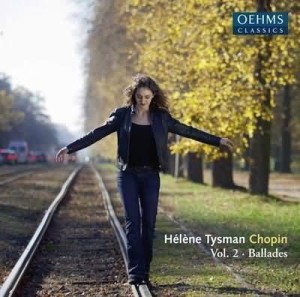Hélène Tysman’s second Oehms Classics Chopin release essentially reinforces the sensitive yet often spongy interpretive characteristics that I noted in my review of her earlier release containing the B-flat minor sonata and Préludes Op. 28 (read review here). The pianist holds back at climaxes in the First Ballade with habitual tenutos and ritards, and tends to voice the Second Ballade Andantino section’s lilting chords with scant attention to the left hand. However, the central agitato section is marvelously assured and impassioned. But the Third Ballade’s longer-than-usual eight-minute-plus timing is not so much due to slow tempos as to a general lack of rhythmic backbone, especially when the music needs to move. If Tysman’s Fourth Ballade doesn’t rise to this work’s most dynamically charged renditions, her steadier pacing, smooth tempo relationships, and welcome contrapuntal clarity in the coda deserve admiration.
In the Op. 24 Mazurkas Tysman sometimes detracts from the music’s dance roots by stretching out certain rubatos to kingdom come, while her super-delicate pianissimos nearly vanish in thin air. As a result, the Op. 24 No. 2 C major’s cross rhythmic shifts do not register in the introduction and coda. The B major Op. 9 No. 3 Nocturne’s textural shifts and major-to-minor-key juxtapositions unfold all on the same uneventful level. After a bland beginning the Barcarolle comes alive when the main theme returns, leading into a beautifully shaped coda where the pianist’s ritardando and diminuendo milk Chopin’s extraordinary harmonic invention to uncommonly tender effect, as Rubinstein always did at this juncture.
While the Polonaise-Fantasie lends itself to Tysman’s rhythmic flexibility, her limited dynamic range, tendency to underplay important melodies, and lack of requisite power in the final pages are real liabilities illuminated by the superb sonic ambience. The booklet notes include an imaginary and rather sophomoric interview between Chopin and Tysman.
































